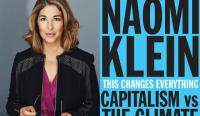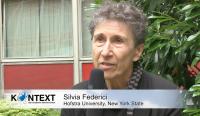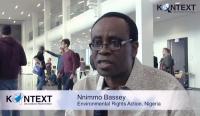Amy Goodman: founder, producer and host of the newscast Democracy Now, Right Livelihood Award laureate, author of "The Silenced Majority", New York City
"The media can be the greatest force for peace on earth. Instead it is wielded as a weapon of war", says Amy Goodman. Critics of war and dissenting opinions are filtered out in the mainstream press. The corporate media would often just reenforce the corporate consensus of corporations together with the well funded politicians, who are funded by those very corporations. This would lead to a narrowing of points of views in the US. "I talk about the silenced majority, because those who are opposed to war, those who are opposed to torture, who are deeply concerned about poverty and corporate control are not a fringe minority. Not even a silent majority, but the silenced majority. Silenced by the corporate media, which is why we have to take it back."
The protests in Wisconsin or the Occupy movement were a response to the growing inequalty and injustice in the US, says Goodman. "Our country has become more and more unequal by the day, one of the most unequal countries in the world. It is extremely serious". But neither the Republicans nor the Democrats wanted to change this political trajectory. For instance president Obama blocked a reform toward a universal health care system a majority of the American population is asking for. At the same time Obama surounds himself with bankers so that they are protected against criminal prosecution. "There has to be a tipping point and I think we're going to see that. And I think the Occupy movement was only the tip of that tipping point."
Amy Goodman and two of her colleagues of Democracy Now were arrested at the Republican Convention in 2008 in St. Paul while they were reporting about a peace march. The case set off a wave of protests that forced the police to release them. Over 40 reporters were arrested at that weekend. Democracy now sued the police and the secret service. They won an agreement that the police had to develop a protocol in dealing with reporters. An important success, says Goodman as the police has become increasingly militarized. She is concerned about the violent repressions of the authorities against the Occupy movements in the country. "This all has to be challenged, because we are talking about a crackdown on an overwhelmingly peaceful movement."
In 1991 and 2004 the US initiated two coup d'etats against the democratically elected Haitian president Bertrand Aristide. East Timor had been invaded by the Indonesian military in 1975. They occupied the Island and killed one third of the population while Washington was supporting the Suharto regime in Jakarta. The US delivered 90 per cent of the weapons for the genocide in East Timor. The corporate media in the US kept silent about the crimes and followed the official statements of Washington. Goodman unveiled the coup d'etats in Haiti, reported about a brutal massacre of the Indonesian military which she survived in 1991. Her reports helped to put pressure on Washington. In the end East Timor achieved its independency in 2002, Aristide could return to Haiti in 2012. "We have a decision - every day. Whether we want to represent the sword or the shield."









